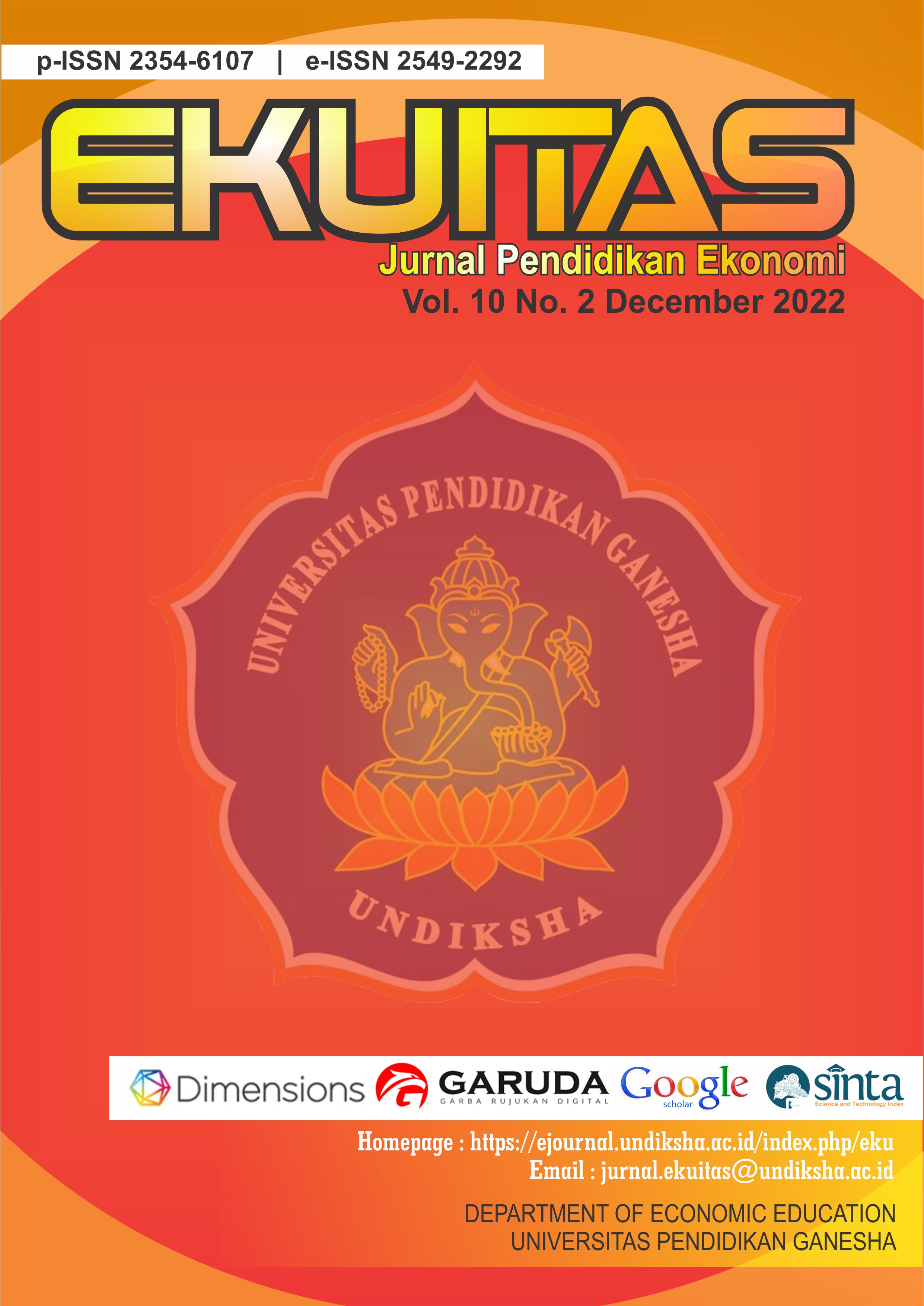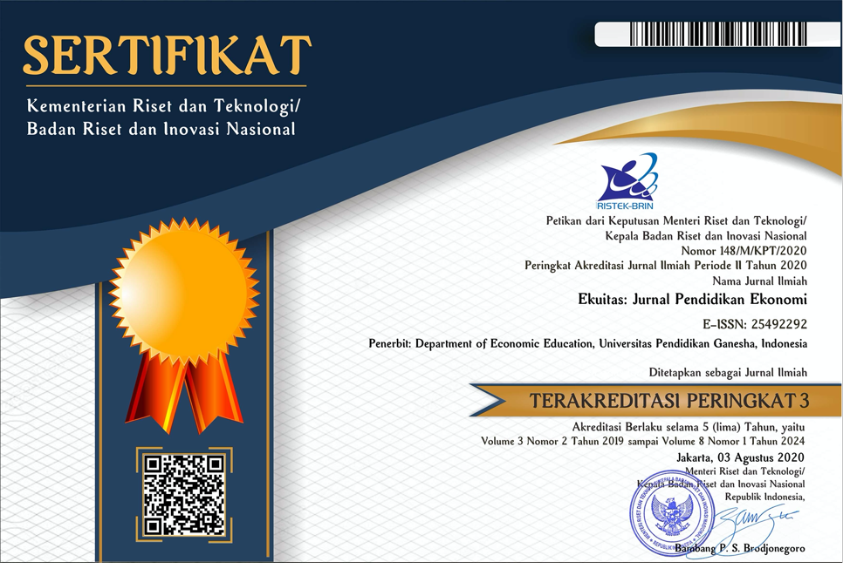Radio Audit: A Visual Podcast Series as The Learning Media to Increase Accounting Students Engagement
DOI:
https://doi.org/10.23887/ekuitas.v10i2.43316Keywords:
Audit, learning, students engagementAbstract
Universities are currently focusing on generic skills and students' critical thinking abilities. The demands on the workplace and the transformation in the field of technology cause theoretical knowledge is not enough to be successful in the workplace. As an auditor, students must have expertise, technical training, and professional skills in order to carry out audit implementation and report preparation. Accounting educators make a variety of innovations in response to the need to transfer knowledge in today's online learning environment, one of which is the use of video as a learning tool. The purpose of this study is to investigate the effect of using video podcasts (Radio Audit) on accounting students' engagement in auditing courses. Through a case study approach, this study found that the use of video podcasts increased student engagement in the third dimension (behavioral, emotional, and cognitive). According to the findings of surveys and interviews with students, the use of video podcasts increases student motivation in studying, increases flexibility, and makes it easier for them to understand the main points that must be mastered so that they can be successful in completing the final exam. This research contributes to the field of education by demonstrating that learning by using video podcasts can be an effective means and expands the study of the use of video podcasts in learning in universities.
References
Andri, R. M. (2017). Peran dan fungsi teknologi dalam peningkatan kualitas pembelajaran. Jurnal Ilmiah Research Sains, 3(1), 122–129. http://www.jurnalmudiraindure.com/wp-content/uploads/2017/04/PERAN-DAN-FUNGSI-TEKNOLOGI-DALAM-PENINGKATAN-KUALITAS-PEMBELAJARAN.pdf
Appleton, J. J., Christenson, S. L., & Furlong, M. J. (2008). Student engagement with school: Critical conceptual and methodological issues of the construct. Psychology in the Schools, 45(5), 369–386. https://doi.org/10.1002/pits.20303
Archambault, I., Janosz, M., Morizot, J., & Pagani, L. (2009). Adolescent behavioral, affective, and cognitive engagement in school: relationship to dropout. Journal of School Health, 79(9), 408–415. https://doi.org/10.1111/j.1746-1561.2009.00428.x
Asonitou, S., & Hassall, T. (2019). Which skills and competences to develop in accountants in a country in crisis? International Journal of Management Education, 17(3). https://doi.org/10.1016/j.ijme.2019.100308
Ayouni, S., Hajjej, F., Maddeh, M., & Alotaibi, S. (2021). Innovations of materials for student engagement in online environment: An ontology. Materials Today: Proceedings. https://doi.org/10.1016/j.matpr.2021.03.636
Bond, M., Buntins, K., Bedenlier, S., Zawacki-Richter, O., & Kerres, M. (2020). Mapping research in student engagement and educational technology in higher education: a systematic evidence map. International Journal of Educational Technology in Higher Education, 17(1). https://doi.org/10.1186/s41239-019-0176-8
Brame, C. (2015). Effective educational videos. http://groups.csail.mit.edu/uid/other-
Calabor, M. S., Mora, A., & Moya, S. (2019). The future of ‘serious games’ in accounting education: A Delphi study. Journal of Accounting Education, 46, 43–52. https://doi.org/10.1016/j.jaccedu.2018.12.004
Chi, M. T. H., Adams, J., Bogusch, E. B., Bruchok, C., Kang, S., Lancaster, M., Levy, R., Li, N., McEldoon, K. L., Stump, G. S., Wylie, R., Xu, D., & Yaghmourian, D. L. (2018). Translating the ICAP theory of cognitive engagement into practice. Cognitive Science, 42, 1777–1832. https://doi.org/10.1111/cogs.12626
Cottrell, S. (2005). Critical thinking skills: Developing effective analysis and argument. Palgrave Macmillan.
D’Aquila, J. M., Wang, D., & Mattia, A. (2019). Are instructor generated YouTube videos effective in accounting classes? A study of student performance, engagement, motivation, and perception. Journal of Accounting Education, 47, 63–74. https://doi.org/10.1016/j.jaccedu.2019.02.002
Dharmayana, I. W., Masrun, Kumara, A., & Wirawan, Y. G. (2012). Keterlibatan siswa (student engagement) sebagai mediator kompetensi emosi dan prestasi akademik. Jurnal Psikologi, 39(1), 76–94.
Dickfos, J., Cameron, C., & Hodgson, C. (2014). Blended learning: Making an impact on assessment and self-reflection in accounting education. Education and Training, 56(2), 190–207. https://doi.org/10.1108/ET-09-2012-0087
Draus, P. J., Curran, M. J., & Trempus, M. S. (2014). The influence of instructor-generated video content on student satisfaction with and engagement in asynchronous online classes. MERLOT Journal of Online Learning and Teaching, 10(2).
Fikrie, F., & Ariani, L. (2019). Keterlibatan siswa (student engagement) di sekolah sebagai salah satu upaya peningkatan keberhasilan siswa di sekolah. Prosiding Seminar Nasional & Call Paper Psikologi Pendidikan, 103–110. https://pendidikan.id/main/forum/diskusi-
Fredricks, J. A., Blumenfeld, P. C., & Paris, A. H. (2004). School engagement: Potential of the concept. Review of Educational Research, 74(1), 59–109.
Greene, B. A. (2015). Measuring cognitive engagement with self-report scales: reflections from over 20 years of research. Educational Psychologist, 50(1), 14–30. https://doi.org/10.1080/00461520.2014.989230
Halim, A. (2004). Teori Akuntansi (Kedua). Erlangga.
Hirschfield, P. J., & Gasper, J. (2011). The relationship between school engagement and delinquency in late childhood and early adolescence. Journal of Youth and Adolescence, 40, 3–22. https://doi.org/10.1007/s10964-010-9579-5
Holtzblatt, M., & Tschakert, N. (2011). Expanding your accounting classroom with digital video technology. Journal of Accounting Education, 29(2–3), 100–121. https://doi.org/10.1016/j.jaccedu.2011.10.003
Hospel, V., Galand, B., & Janosz, M. (2016). Multidimensionality of behavioural engagement: Empirical support and implications. International Journal of Educational Research, 77, 37–49. https://doi.org/10.1016/j.ijer.2016.02.007
Indiani, B. (2020). Mengoptimalkan proses pembelajaran dengan media daring pada masa pandemi covid-19. Jurnal Sipatokkong BPSDM Sulawesi Selatan, 1(3), 227–232.
Jimerson, S. R. (2003). The california school psychologist provides valuable information regarding school engagement, youth development, and school success. The California School Psychologist, 8, 3–6.
Kahn, P., Everington, L., Kelm, K., Reid, I., & Watkins, F. (2017). Understanding student engagement in online learning environments: the role of reflexivity. Educational Technology Research and Development, 65(1), 203–218. https://doi.org/10.1007/s11423-016-9484-z
Kay, R. H. (2012). Exploring the use of video podcasts in education: A comprehensive review of the literature. Computers in Human Behavior, 28(3), 820–831. https://doi.org/10.1016/j.chb.2012.01.011
Kleinman, G., & Anandarajan, A. (2011). Inattentional blindness and its relevance to teaching forensic accounting and auditing. Journal of Accounting Education, 29(1), 37–49. https://doi.org/10.1016/j.jaccedu.2011.08.002
Miles, M. B., & Huberman, A. M. (1992). Analisis data kualitatif buku sumber tentang metode-metode baru. Uip.
Miles, M. B., Huberman, A. M., & Johnny, S. (2014). Qualitative data analysis: a methods sourcebook (3rd ed). Sage Publication.
Oktaria, N., & Tjandrakirana, R. (2012). Pengaruh kompetensi dan independensi auditor terhadap kinerja auditor internal bank BUMN di kanwil Palembang. 6(1).
Pawicara, R., & Conilie, M. (2020). Analisis pembelajaran daring terhadap kejenuhan belajar mahasiswa tadris biologi IAIN Jember di tengah pandemi covid-19. ALVEOLI: Jurnal Pendidikan Biologi, 1(1), 29–38.
Pincus, K. v., Stout, D. E., Sorensen, J. E., Stocks, K. D., & Lawson, R. A. (2017). Forces for change in higher education and implications for the accounting academy. Journal of Accounting Education, 40, 1–18. https://doi.org/10.1016/j.jaccedu.2017.06.001
Ponitz, C. C., Rimm-Kaufman, S. E., Grimm, K. J., & Curby, T. W. (2009). Kindergarten classroom quality, behavioral engagement, and reading achievement. School Psychology Review, 38(1), 102–120. https://doi.org/10.1080/02796015.2009.12087852
Rackaway, C. (2012). Video killed the textbook star?: Use of multimedia supplements to enhance student learning. Journal of Political Science Education, 8(2), 189–200. https://doi.org/10.1080/15512169.2012.667684
Redmond, P., Abawi, L. A., Brown, A., Henderson, R., & Heffernan, A. (2018). An online engagement framework for higher education.
Online Learning Journal, 22(1), 183–204. https://doi.org/10.24059/olj.v22i1.1175
Roepen, D. (2017). Australian business graduates’ perceptions of non-technical skills within the workplace. Education and Training, 59(5), 457–470. https://doi.org/10.1108/ET-01-2017-0016
Salsabila, U. H., Sari, L. I., Lathif, K. H., Lestari, A. P., & Ayuning, A. (2020). Peran teknologi dalam pembelajaran di masa pandemi covid-19. Al-Mutharahah: Jurnal Penelitian Dan Kajian Sosial Keagamaan, 17(2), 188–198. https://doi.org/10.46781/al-mutharahah.v17i2.138
Saputra, M. D., Joyoatmojo, S., Wardani, D. K., & Sangka, K. B. (2019). Developing critical-thinking skills through the collaboration of jigsaw model with problem-based learning model. International Journal of Instruction, 12(1), 1077–1094. www.e-iji.net
Sargent, C. S., Borthick, A. F., & Lederberg, A. R. (2011). Improving retention for principles of accounting students: Ultra-short digital tutorials for motivating effort and improving performance. American Accounting Association, 26(4), 657–679. https://doi.org/10.2308/iace-00001
Shih, S. S. (2008). The relation of self-determination and achievement goals to Taiwanese eighth graders’ behavioral and emotional engagement in schoolwork. Elementary School Journal, 108(4), 313–334. https://doi.org/10.1086/528974
Sinatra, G. M., Heddy, B. C., & Lombardi, D. (2015). The challenges of defining and measuring student engagement in science. Educational Psychologist, 50(1). https://doi.org/10.1080/00461520.2014.1002924
SPAP. (2001). Standar Profesional Akuntan Publik. Salemba Empat.
Teo, T., Unwin, S., Scherer, R., & Gardiner, V. (2021). Initial teacher training for twenty-first century skills in the fourth industrial revolution (IR 4.0): A scoping review. Computers and Education, 170. https://doi.org/10.1016/j.compedu.2021.104223
Wardani, D. N., Toenlioe, A. J. E., & Wedi, A. (2018). Daya tarik pembelajaran di era 21 dengan blended learning. Jurnal Kajian Teknologi Pendidikan, 1(1), 13–18.
Wigfield, A., Guthrie, J. T., Perencevich, K. C., Taboada, A., Klauda, S. L., Mcrae, A., & Barbosa, P. (2008). Role of reading engagement in mediating effects of reading comprehension instruction on reading outcomes. Psychology in the Schools, 45(5), 432–445. https://doi.org/10.1002/pits.20307
Yin, R. K. (2003). Case study research: design and methods (3rd ed). Thousand Oaks, CA.
Zepke, N. (2017). Student engagement in neo-liberal times: what is missing? Higher Education Research and Development, 37(2), 433–446. https://doi.org/10.1080/07294360.2017.1370440
Downloads
Published
How to Cite
Issue
Section
License
Copyright (c) 2022 Ekuitas: Jurnal Pendidikan Ekonomi

This work is licensed under a Creative Commons Attribution-ShareAlike 4.0 International License.








